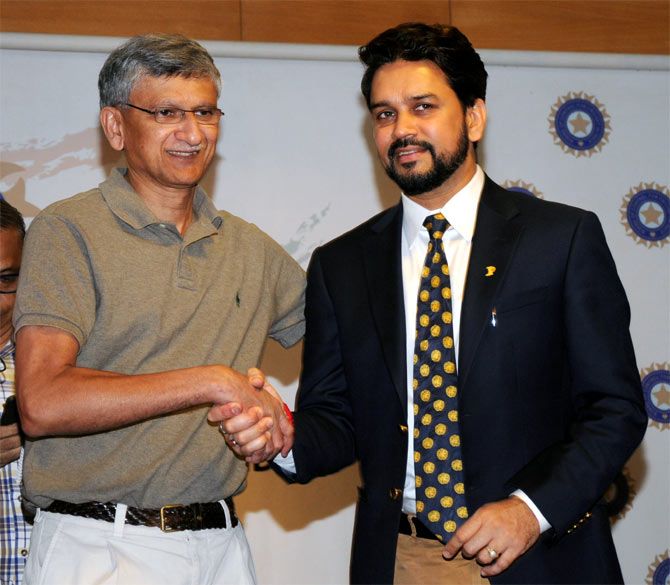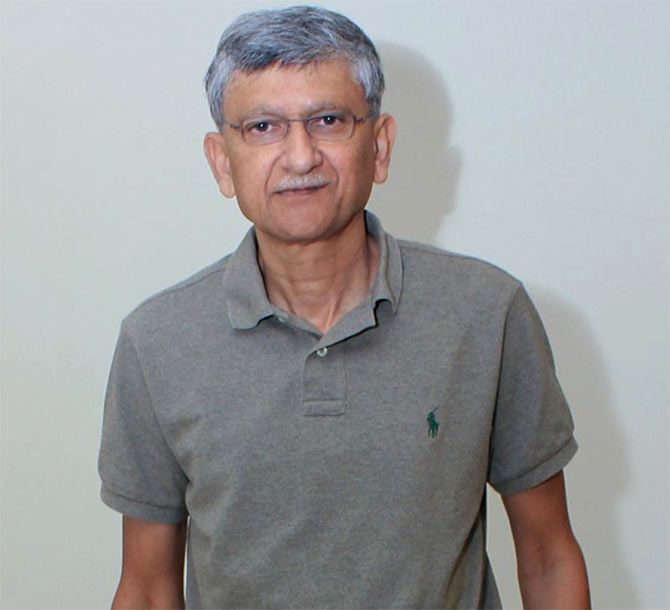'The main reason for having neutral venues for the Ranji Trophy is to make it more competitive and less affected by doctoring of wickets.'
'There is no reason why people shouldn't be able to see Virat Kohli playing a Ranji Trophy match at any location.'
BCCI Secretary Ajay Shirke speaks to Harish Kotian/Rediff.com in an exclusive interview.

The Board of Control for Cricket in India has been grappling with credibility issues following the IPL spot-fixing scandal in 2013. The subsequent reforms suggested by the Supreme Court-appointed Justice Lodha Committee and the apex court's observations have brought its functioning into the limelight, indicating an urgent need for it to be more transparent and accountable to the public.
In such circumstances, the BCCI could not have had a more able and credible person than Ajay Shirke to take over the key position of secretary to run its day-to-day affairs.
Shirke quit as BCCI treasurer in 2013, expressing his displeasure over the manner in which the then board president, Narayanswami Srinivasan, handled the IPL spot-fixing issue.
Regarded as one of the most honest and dedicated cricket administrators in the country, Shirke transformed the Maharashtra Cricket Association since joining it in 2003 and taking over as its president two years later.
Given his proven track record as an administrator and, of course, his clean image, it was no surprise that the BCCI's new President Anurag Thakur immediately chose him as BCCI secretary.
A former member of the IPL Governing Council and several BCCI committees, Shirke was also vice-chairman at the BCCI's National Cricket Academy in Bengaluru. If there is a world-class cricket stadium in Gahunje, near Pune, which was recently conferred Test status, it is because of Shirke's efforts.
Away from the cricket arena, the 62 year old is a successful businessman; he owns Cadence Audio, one of Europe's best-known brands manufacturing high-end speakers.
In this first part of a freewheeling interview with Harish Kotian/Rediff.com, check out what Ajay Shirke has in mind for a revamp of the BCCI.
You resigned in 2013 during the Srinivasan era and returned after nearly a year-and-a-half out. What made you reverse the decision?
I resigned for a certain reason. I resigned because I felt I was in disagreement with the decisions that were taken with regards to the controversies that had erupted then. So rather than fight or confront my president (Srinivasan), who obviously had differing views, I resigned.
That's fine, anybody can have differing views, but since I was appointed treasurer under his leadership I decided to go away.
Now, when the question came up, when (Shashank) Manohar left and there was a vacancy, a lot of the members felt that there was a need and they requested me. They asked me and then there was this discussion and people felt I may be able to help or contribute to the Board at this point.
Since they requested, I thought, 'yes, maybe, I can come back and do my bit' and that is why I decided to reconsider.
If you recollect, even then (in 2013) I was reconsidering, at which time because there was no change in anything else I did not reconsider.
Can you elaborate the reasons why you quit the BCCI in 2013?
First of all, I have got the highest regard for Srinivasan and his administrative abilities. He was one of our finest administrators. He was selfless as far as managing cricket is concerned.
This was an issue that was may be too close to his immediate surroundings and, therefore, there might have been an error of judgement.
So when this IPL spot-fixing controversy happened (in 2013), I said I don't want to fight with him -- because he had brought me as the treasurer -- and I left.
What other option did I have then? The honourable way was to exit.
They asked us to join again, but we said there is no point in joining back because nothing has changed.
Now, if you look back, in hindsight, if he had an impartial inquiry into it, the whole saga would have ended.
And what did this judgment come out of? It is not somebody who has gone to court against us, but we have gone to court and got this order on us.
This order is passed in the application filed by the BCCI. You see people forget events. The Bombay high court passed an order against the two-judge inquiry and that was challenged in the Supreme Court and the net result of that is the Lodha Commission.
Your take on Shashank Manohar's second innings as BCCI chief. The Board was going through some tough times when he took over the second time.
Shashank Manohar... when he came he immediately took a lot of steps or decisions which were very crucial in increasing the transparency, or rather addressing the aspirations of cricket fans, with regards to the functioning of the Board. Those decisions are very vital and those decisions are important.
Now the question is about the rigorous implementation of those decisions. That phase has started now and any policy or any decision is as good as its implementation. That is what we have to ensure that the good decisions that he took are implemented in all seriousness.
You now hold the important position of secretary. What systems do you propose to ensure the smooth running of the BCCI?
Now we are already being assisted by a lot of professionals. Mr Rahul Johri has formally taken over today (June 1, 2016). Although he was already attending key meetings for a couple of days, today he has formally taken over as the CEO.
We have also appointed a CFO who will be joining shortly. These people come with a lot of professional experience.
The CEO has worked in various positions. He was recommended in the entire selection process which was done by a leading head hunting agency. The chief finance officer (Santosh Rangnekar) comes from no less an organisation than Tata Sons. So these are all people of impeccable professional credentials.
Now that these people are on board, what I want to focus on is making the BCCI a system-driven organisation, so that it is more system-driven, it is more process-driven.
For everything there is a system, there is a method. Effectively, that reduces the importance of persons who come and go in the BCCI as office-bearers, because whoever it is, they will follow the process. They can make policy changes, but the process will be there.
What has happened is that the BCCI is not bereft of any processes. The growth of the BCCI is unprecedented; it has grown at a very fast pace.
So, maybe, there might be a little bit of lag between the growth of the game and the growth of the size of the organisation as against the systems and processes that needed to have grown with it.
That is a correction issue which we are addressing. We will focus on that to make it into a more system-driven organisation.

What makes Anurag Thakur the perfect choice as the BCCI's leader? He was elected unopposed. We haven't had someone so young in the top post in the last 30 years or so.
As secretary, you will be working very closely with him in running Indian cricket.
I have known him for a long time because I have also been associated with the Board for quite some time. I have known him and I share a very excellent rapport with him.
He is young, but he also has the unique advantage of being very experienced at a very young age, which is a great thing for the Board, because youth is a very big asset in many ways.
While he is young, he also has the unique combination of experience, because he himself has been a cricket administrator for many, many, years.
In the official capacity, we have interacted in the past too when I was the treasurer and he was the secretary. So we have had a very good understanding about the way we work together. Our ideas and goals are very similar.
Whatever I have seen in the last few days, he is truly playing a president's role and our roles are fitting very well because he is my boss and I report to him and we have already set up a very good line of interaction and communication.
I think Anurag Thakur can easily lead BCCI into a new era.
At your joint press conference last month Mr Thakur and you came up with a lot of measures to draw more spectators to watch Test matches in India.
At the same time, will the BCCI also be giving a thought to get in more spectators for Ranji Trophy games?
The technical committee has suggested having matches at neutral venues, which might deprive a lot of loyal fans from watching their home teams play Ranji games.
How do you look at that development?
Linking of all the issues that revolve around the Ranji Trophy and finding a solution to every one of those issues is almost impossible. Linking the crowd issue to the neutral venues issue is not even fair nor is it necessary, because even at home venues, let us say everybody is playing all their Ranji matches at home venues, the experience of home venues, as far as crowd gathering is concerned, has not been great.
Even if a team is playing at home, the Ranji Trophy does not get that kind of crowd, therefore, those two things are not connected in my opinion.
Now the reason why this neutral venue thing has been done is completely different and that is too minimise the issues related to doctoring of wickets beyond any reasonable levels for home advantage.
There are many options for this. In England they are trying that there is no toss and the visiting captain has the choice to bowl.
All these were considered, but it was felt by all the people, including Sourav Ganguly (chairman of the BCCI's technical committee) that the best option would be to have matches at neutral venues.
Talking about getting crowds -- the arguments that are being put forward, I read some of them -- they are saying that the feeling of playing will be lost or somebody will never be able to see a great star playing in his home ground, but, equally, somebody who is getting a chance to see that great star there is no reason why people from an away city should not be able to see somebody like a Virat Kohli playing a Ranji Trophy match at any location.
The primary reason we have done it is to make the Ranji Trophy more competitive and less affected by doctoring of wickets; that is the main reason.
Like I told you, if we try to find a solution which meets all the so many criteria that you put around it, we will almost not be able to find any one solution.
The Karnataka government is apparently keen to keep the NCA in the state by asking the relevant authorities to identify a suitable location. This came after the BCCI said it wanted to move the NCA to another state.
First of all, we have not decided on any particular location. We decided to have Karnataka as our base way back in 2005; now so many governments have come and gone. We have locked Rs 50 crore (Rs 500 million) of the Board in a piece of land which they have allotted and which we are not able to get possession of.
If the Karnataka government is keen, first of all they should refund our Rs 50 crore and immediately give us the other land or adjust the amount and give us the other land.
We have no favourites in this and we have given them almost 11 years, from 2005 to 2016. We bought this land in 2008, but I think the decision was made in 2005-06, so how long can we wait?
What will make the BCCI consider taking up the DRS (Decision Review System) issue?
Aren't the players convinced about it yet? What changes are needed for India to accept it?
This is a technical issue. This was discussed in the BCCI technical committee meeting. On all such decisions I never comment unless there is a mandate of that particular committee.
So far there is no mandate. As and when that issue is discussed, I will be able to provide a decision to you or provide an opinion on it.
- Check out the second part of Ajay Shirke's exclusive interview: 'By removing advertising from cricket, will BCCI become better?'







 © 2025
© 2025